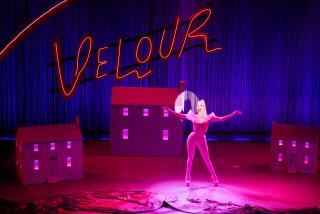STAGE REVIEW : The Larger-Than-Life Style of ‘Lulu’
- Share via
LA JOLLA — Woman. Manipulator or manipulated? Mantis or mannequin? The question, in a world largely ruled by men, has been ceaselessly debated, while the prototype is as ancient as Hatshepsut of Egypt and as recent as Marilyn Monroe.
Prominent in the torrent of history/books/films/plays that has coursed between these prototypes is Frank Wedekind’s sexually fraught “Lulu,” unpublishable when written in 1895, later unevenly divided into two tamer plays retitled “Earthspirit” and “Pandora’s Box.”
The version that opened Sunday at the La Jolla Playhouse is a new, arduously reconstructed translation/adaptation by Roger Downey that attempts to go back in spirit and structure to Wedekind’s original five-act drama. Given the production’s flamboyance and--ultimately--lurid power, it is forgiven some minor sodden stretches.
What it has going for it is what one has come to expect from this theater: size, ambition, fearlessness. Sharon Ott’s staging is steeped in the color of blood and the shadows of death.
For the first four acts, designer John Arnone drapes the stage in opulent configurations of fringed red velvet, its height shot through by a thin black spiral staircase.
Upstage left are the skeletons in Lulu’s closets. In the final act, when things really turn to black, Peter Maradudin’s footlights probe the darkness, casting large and chilling shadows. All is sensual contradiction: diaphanous and blunt; decorous and grotesque.
In this context lies the play, a larger-than-life “Lulu” that makes the best use yet of the theater’s larger-than-life stage. Downey’s reconstruction/adaptation is couched in a fluent idiom. His earlier translation of “Figaro Gets a Divorce” for the playhouse was equally burnished. But where the language of “Figaro” was buried under presentational excess, “Lulu’s” is crisp and clear. So is the sharpness of its message: Woman, defined by centuries of male brutality (psychological as much as physical), struggles to redefine herself. Victim, she becomes bird of prey. Like Regina in “The Little Foxes”; like, believe it or not, “Pygmalion’s” Eliza Doolittle, shaped and tyrannized by Professor Higgins.
Ott seizes on the Downey version’s considerable humor as much as she captures the play’s Victorian/voyeuristic preoccupation with sex and death. In the long run, “Lulu” is a disturbing roller-coaster ride to hell, littered with corpses.
The production’s crucial virtue is the casting of Elizabeth Berridge in the vulgar title role, without which no persuasive case can be made. Her child/woman pout and Lolita whine, her vanity, her raw table manners, her voluptuary’s creaminess (sheathed in protective coldness that slowly twists into a hardness and also beautifully costumed by Deborah M. Dryden), are at the steely core of the characterization. It reeks, as it must, of paradox: a creature at once bewitching and bewildering, tainted and haunting--and sure to rekindle discussion on woman as monster or madonna.
The rest of the play is at least as well cast, with Harris Yulin especially compelling as Dr. Schon, the love of Lulu’s life, a Svengali, who did the most to corrupt her and is finally destroyed by a passion he cannot control. Notable too is Ellen Crawford as the Countess Geschwitz who gives up everything in a helpless lesbian fixation over the unrequiting Lulu--and Lenny Von Dohlen as Schon’s complex son Alwa, whose fascination with her is mixed with love/hate for his father.
The size of the play and the scope of Wedekind’s subject matter are well-suited to this theater’s taste for the grandiose and the large theatrical gesture. But where these have sometimes derailed plays with excesses in the past, “Lulu” is one offering in which substance is optimally balanced by style.
Performances at the Mandell Weiss Center for the Performing Arts, Torrey Pines Road and La Jolla Village Drive, on the UC San Diego campus, run Tuesdays through Sundays, 8 p.m., with matinees Saturdays and Sundays at 2. Ends Aug. 7. Tickets: $15-$24; (619) 534-3960.
‘LULU’
The Frank Wedekind play. Translation and adaptation Roger Downey. Director Sharon Ott. Assistant director Nikki Appino. Sets John Arnone. Lights Peter Maradudin. Costumes Deborah M. Dryden. Music and sound Stephen LeGrand and Eric Drew Feldman. Dramaturge Walter Biderback. Stage manager Connie Drew. Cast Harris Yulin, Peter Silbert, Elizabeth Berridge, Humbert Allen Astredo, Lenny Von Dohlen, Jessica Black, William Newman, Richard Zobel, Ellen Crawford, Philip Reza, Robert Gray.
More to Read
The biggest entertainment stories
Get our big stories about Hollywood, film, television, music, arts, culture and more right in your inbox as soon as they publish.
You may occasionally receive promotional content from the Los Angeles Times.










